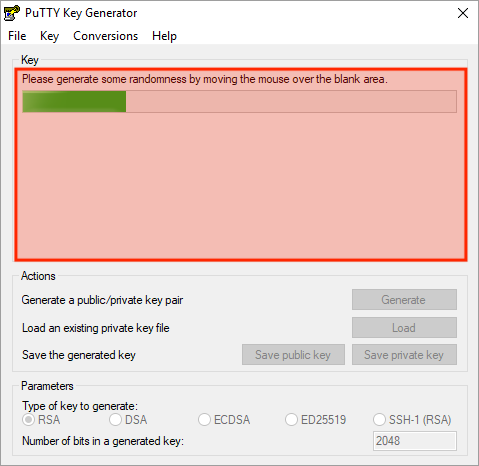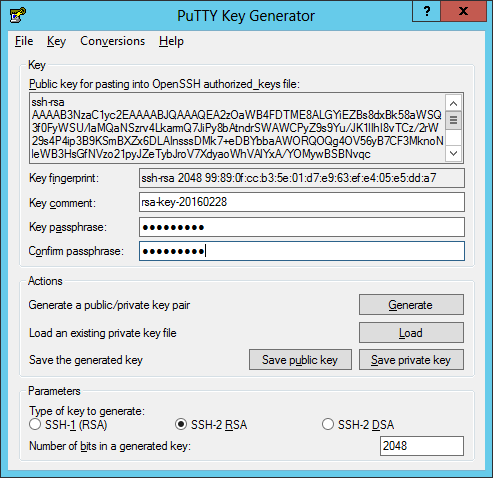Generate Public Ssh Key Windows
- Generate Ssh Public Key Windows
- Generate Public Ssh Key Windows 10
- Generate Ssh Key Windows Cmd
- Generate Public Ssh Key Windows Command Line
Sep 26, 2019 To generate an SSH key with PuTTYgen, follow these steps: Open the PuTTYgen program. For Type of key to generate, select SSH-2 RSA. Click the Generate button. Move your mouse in the area below the progress bar. When the progress bar is full, PuTTYgen generates your key pair. To create a new key pair, select the type of key to generate from the bottom of the screen (using SSH-2 RSA with 2048 bit key size is good for most people; another good well-known alternative is ECDSA). Then click Generate, and start moving the mouse within the Window. Putty uses mouse movements to.
On Windows, you can create SSH keys in many ways. This document explains how to use two SSH applications, PuTTY and Git Bash.
If an activation error occurs EZ-Activator can automatically try to make any corrections, or cancel all changes in the event of total failure.Some features:. Activation of Office 2010 (Using KMS). Activator gathers information about your license for Office 2010 to provide the best method of activation. Cd key generator free.
Generate a private and public key pair: Go to the Windows Start menu - All Programs - PuTTY and open PuTTYgen Click the 'Generate' button and PuTTYgen will ask you to make some random movement with your mouse until it has enough random data to generate a secure key for you. 7) Enter the key passphrase and confirm it. 8) Click the button ‘Save private key’ to save the private key. 9) Click the button ‘Save public key’ to save the public key. 10) Make sure to copy the text in the field ‘Public key for pasting into openSSH authorized keys file. That is how we can generate SSH key in Windows using putty. May 23, 2019 Configuring the Client and Generating a Key Pair. The first step to using key-based authentication is to generate a key pair - a set of matching public and private keys. The OpenSSH client capability in Windows includes the tools required to do so. Follow this process using PowerShell from the client computer you will be connecting from. Generating a Secure Shell (SSH) Public/Private Key Pair Generating an SSH Key Pair on Windows Using the PuTTYgen Program The PuTTYgen program is part of PuTTY, an open source networking client for the Windows platform. If you don't already have an SSH key, you must generate a new SSH key. If you're unsure whether you already have an SSH key, check for existing keys. If you don't want to reenter your passphrase every time you use your SSH key, you can add your key to the SSH agent, which manages your SSH keys and remembers your passphrase.
Joyent recommends RSA keys because the node-manta CLI programs work with RSA keys both locally and with the ssh agent. DSA keys will work only if the private key is on the same system as the CLI, and not password-protected.
PuTTY
PuTTY is an SSH client for Windows. You can use PuTTY to generate SSH keys. PuTTY is a free open-source terminal emulator that functions much like the Terminal application in macOS in a Windows environment. This section shows you how to manually generate and upload an SSH key when working with PuTTY in the Windows environment.
About PuTTY
PuTTY is an SSH client for Windows that you will use to generate your SSH keys. You can download PuTTY from www.chiark.greenend.org.uk.
When you install the PuTTY client, you also install the PuTTYgen utility. PuTTYgen is what you will use to generate your SSH key for a Windows VM.
| This page gives you basic information about using PuTTY and PuTTYgen to log in to your provisioned machine. For more information on PuTTY, see the PuTTY documentation |
|---|
Generating an SSH key
To generate an SSH key with PuTTYgen, follow these steps:
- Open the PuTTYgen program.
- For Type of key to generate, select SSH-2 RSA.
- Click the Generate button.
- Move your mouse in the area below the progress bar. When the progress bar is full, PuTTYgen generates your key pair.
- Type a passphrase in the Key passphrase field. Type the same passphrase in the Confirm passphrase field. You can use a key without a passphrase, but this is not recommended.
- Click the Save private key button to save the private key. You must save the private key. You will need it to connect to your machine.
- Right-click in the text field labeled Public key for pasting into OpenSSH authorized_keys file and choose Select All.
- Right-click again in the same text field and choose Copy.
Importing your SSH key
Now you must import the copied SSH key to the portal.
- After you copy the SSH key to the clipboard, return to your account page.
- Choose to Import Public Key and paste your SSH key into the Public Key field.
- In the Key Name field, provide a name for the key. Note: although providing a key name is optional, it is a best practice for ease of managing multiple SSH keys.
- Add the key. It will now appear in your table of keys under SSH.
PuTTY and OpenSSH use different formats of public SSH keys. If the text you pasted in the SSH Key starts with —— BEGIN SSH2 PUBLIC KEY, it is in the wrong format. Be sure to follow the instructions carefully. Your key should start with ssh-rsa AAAA….
Once you upload your SSH key to the portal, you can connect to your virtual machine from Windows through a PuTTY session.
Git Bash
The Git installation package comes with SSH. Using Git Bash, which is the Git command line tool, you can generate SSH key pairs. Git Bash has an SSH client that enables you to connect to and interact with Triton containers on Windows.
To install Git:
- (Download and initiate the Git installer](https://git-scm.com/download/win).
- When prompted, accept the default components by clicking Next.
- Choose the default text editor. If you have Notepad++ installed, select Notepad++ and click Next.
- Select to Use Git from the Windows Command Prompt and click Next.
- Select to Use OpenSSL library and click Next.
- Select to Checkout Windows-style, commit Unix-style line endings and click Next.
- Select to Use MinTTY (The default terminal of mYSYS2) and click Next.
- Accept the default extra option configuration by clicking Install.
When the installation completes, you may need to restart Windows.

Launching GitBash
To open Git Bash, we recommend launching the application from the Windows command prompt:
- In Windows, press Start+R to launch the Run dialog.
- Type
C:Program FilesGitbinbash.exeand press Enter.
Generating SSH keys
First, create the SSH directory and then generate the SSH key pair.
One assumption is that the Windows profile you are using is set up with administrative privileges. Given this, you will be creating the SSH directory at the root of your profile, for example:
- At the Git Bash command line, change into your root directory and type.

Change into the .ssh directory
C:Usersjoetest.ssh- To create the keys, type:
- When prompted for a password, type apassword to complete the process. When finished, the output looks similar to:
Uploading an SSH key
To upload the public SSH key to your Triton account:
- Open Triton Service portal, select Account to open the Account Summary page.
- From the SSH section, select Import Public Key.
- Enter a Key Name. Although naming a key is optional, labels are a best practice for managing multiple SSH keys.
- Add your public SSH key.
When Triton finishes the adding or uploading process, the public SSH key appears in the list of SSH keys.
What are my next steps?
- Adding SSH keys to agent.
- Set up the Triton CLI and CloudAPI on Windows.
- Set up the Triton CLI and CloudAPI.
- Create an instance in the Triton Service Portal.
- Set up the
triton-dockercommand line tool. - Visit PuTTYgen to learn more about the PuTTYgen and to seethe complete installation and usage guide.
There are three main ways to generate a public key in Windows. We've tried them all with Windows 7, but given the PuTTY tools are most popular, they are documented first. Whichever method you choose, email your generated key to your designated manager and they will notify you when your account has been created. Note, if you have multiple keys because you have multiple machines, or perhaps you have different keys for different software, send them all to us - we can set you up with as many keys as you want bound to your Code Enigma account.
PuTTY
This is a Free Open Source Software (FOSS) solution for Windows that allows Windows users to generate SSH keys and use them to access Linux servers via an SSH connection.
[1] Download and run the PuTTY 'Installer' from this page:
[2] Generate a private and public key pair:
- Go to the Windows Start menu -> All Programs -> PuTTY and open PuTTYgen
- Click the 'Generate' button and PuTTYgen will ask you to make some random movement with your mouse until it has enough random data to generate a secure key for you
- Click the 'Save private key' button and save the resulting file somewhere safe and only accessible by you!
[3] Export Public key to the Linux server:
In the grey box at the top, entitled 'Public key for pasting into OpenSSH authorized_keys file', there will be a string of nonsense. Copy all of this string into an email and send it to us, as per the opening instruction on this page.
That's it, you're done!
Git Bash
This is a light-weight terminal client for using Git from the command line on Windows. It's a sort of scaled down version of CygWin, and one of the nice things about it is it permits normal 'Terminal' access to Linux servers.
[1] Download and run the latest version from this page:
The installer will open msysGit when it completes, follow the instruction to create a shortcut:
[2] Generate a private and public key pair:
Follow steps 1 and 2 of the GitHub instructions found here:
Generate Ssh Public Key Windows
Key in generating a bell curve psychology. At step 3, use the 'clip' command as instructed, but paste the result into an email and send it.
Bitvise
If none of the above works, there's also Bitvise, which is not FOSS, but is freely available for personal use, and even individual use within an organisation, so it's a good and legal option.
[1] Download the Bitvise SSH client software:
[2] Generate a private and public key pair:
- click the link titled 'User keypair manager' in the Login tab;
- click the button [Generate New ..];
- choose ssh-rsa and 1024bits;
- you can enter passphrase or leave it empty
- click the button [Generate]
Generate Public Ssh Key Windows 10
This passphrase is not sent to the remote host, and it is only used to protect your private key. Otherwise, anyone who has access to your private key can authenticate to your account automatically.
[3] Export Public key to the Linux server:
- Go to the 'User keypair manager';
- click the keypair in the slots;
- click the button [Export];
- chose 'Export public key' and 'OpenSSH format';
- click the button [Export];
Generate Ssh Key Windows Cmd
The result should look something like:
Generate Public Ssh Key Windows Command Line
Email just this public part to Code Enigma, as per instructions.